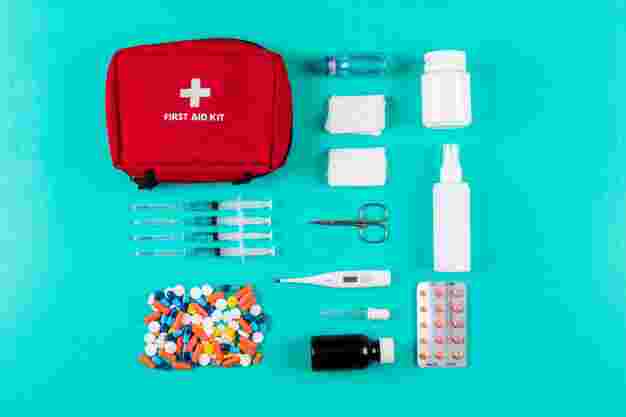Traveling is one of the most enriching experiences life has to offer, but even the most exciting adventures can be disrupted by unexpected health issues. From stomach upsets to sudden fevers, from insect bites to minor injuries, travelers often encounter health problems that can be difficult to manage when far from home. The best way to prepare for such situations is to pack a well-stocked Travel medicine kit.
A thoughtfully prepared kit ensures you are ready to handle common ailments on the go and provides peace of mind, knowing you can respond quickly to minor emergencies. Beyond just bandages and painkillers, your kit should include prescription medications, specialized supplies, and in some cases, Emergency Antibiotics to safeguard against infections.
The must-have supplies for your travel medicine kit, breaking them down into categories to help you build a reliable and effective companion for all your journeys.
Essential Medications for Travelers
Over-the-Counter Basics
A travel medicine kit should begin with the basics. Pain relievers such as acetaminophen or ibuprofen are indispensable for headaches, fevers, and general aches. Antihistamines are useful for allergies or unexpected reactions to food, insect bites, or environmental triggers. Additionally, consider carrying antacids and anti-nausea medications to handle digestive issues, which are among the most common travel-related complaints.
Prescription Medications
If you have chronic conditions like asthma, diabetes, or high blood pressure, carrying enough of your prescription medications is non-negotiable. Always store them in their original containers with clear labels, and bring a copy of your prescriptions to avoid complications at customs. This not only ensures continuity of care but also prevents stressful situations if you run out during your trip.
Emergency Antibiotics
While not a replacement for professional care, having Emergency Antibiotics in your kit can be a lifesaver when access to healthcare is delayed. They are especially useful for managing conditions like severe traveler’s diarrhea, urinary tract infections, or respiratory infections. Responsible use is key: antibiotics should only be taken when absolutely necessary and ideally after medical consultation.
First Aid Supplies for Injuries
Bandages and Wound Care
Accidents happen anywhere, whether you’re hiking in the mountains or exploring a busy city. Stock your Travel medicine kit with adhesive bandages in multiple sizes, sterile gauze pads, and medical tape. These supplies are essential for protecting cuts, scrapes, or blisters from infection and helping them heal faster.
Antiseptics and Disinfectants
Keeping wounds clean is just as important as covering them. Include antiseptic wipes, hydrogen peroxide, or iodine solutions to disinfect injuries before applying bandages. Alcohol swabs and hand sanitizer also provide quick solutions for hygiene when soap and water are not available.
Practical Medical Tools
Small yet effective tools can make your kit more functional. A digital thermometer helps track fevers accurately. Tweezers can remove splinters or ticks, while scissors are essential for trimming bandages. Disposable gloves are another smart addition, ensuring safe wound care when assisting yourself or others.
Health Items for Travel Comfort
Motion and Travel Sickness Relief
Long flights, winding bus rides, and boat trips can trigger motion sickness in even the most seasoned travelers. Pack motion sickness tablets, ginger capsules, or acupressure wristbands to ease symptoms and ensure a smoother journey.
Protection from Sun and Heat
Exposure to harsh climates can cause sunburn, dehydration, or heat exhaustion. Your Travel medicine kit should include sunscreen with high SPF, aloe vera gel for soothing sunburn, and electrolyte powders to restore hydration after long hours in the sun. These items can prevent discomfort and serious health issues in tropical or desert destinations.
Cold, Flu, and Allergy Care
Traveling exposes you to crowded spaces like airports, buses, and tourist attractions where viruses spread easily. Cold and flu remedies such as throat lozenges, decongestants, and saline nasal sprays are useful to have on hand. Allergy relief medications also ensure you’re prepared for exposure to pollen, dust, or unfamiliar foods.
Organization and Practical Tips
Storing Your Travel Medicine Kit
How you store your kit can make a big difference. Choose a waterproof, durable pouch with compartments to keep supplies organized. Clear labeling helps you find items quickly during stressful moments. Compact but spacious designs are best for fitting everything without taking up too much luggage space.
Checking Expiration Dates and Refills
Before every trip, review your kit to ensure nothing is expired. Outdated medications, especially Emergency Antibiotics, may lose effectiveness or even become harmful. Restock items like pain relievers, antiseptics, and allergy medications to make sure your supplies are ready when you need them most.
Adding Medical Documents and Contacts
In addition to physical supplies, include important documentation. Carry a list of emergency contacts, your health insurance details, and a brief medical history including allergies and chronic conditions. This information is invaluable if you require medical care abroad and cannot communicate effectively due to language barriers or illness.
Conclusion
A carefully prepared Travel medicine kit is more than just a collection of medical supplies it’s your safety net when exploring new places. Whether it’s treating a simple headache, soothing a sunburn, or managing an unexpected infection, a reliable kit ensures you’re never caught off guard.
Including Emergency Antibiotics provides additional protection for situations where medical help may be delayed, though they should always be used responsibly and only when necessary. With thoughtful planning and the right supplies, your travels can remain enjoyable and stress-free, no matter what challenges arise.
When it comes to preparing for health on the go, reliable support matters. With trusted providers like Readymed Healthcare, you can travel with confidence, knowing that your health is always a priority.




